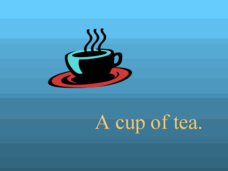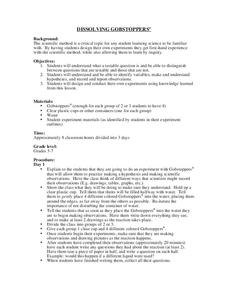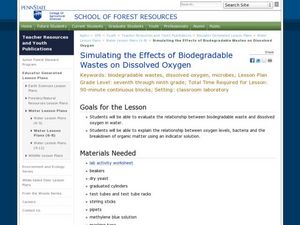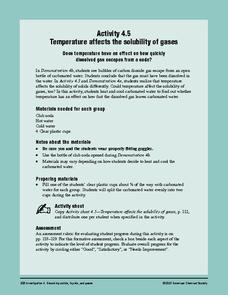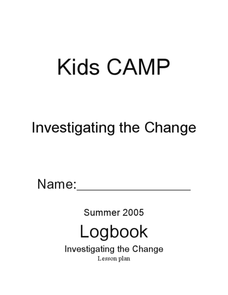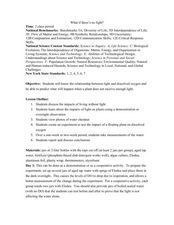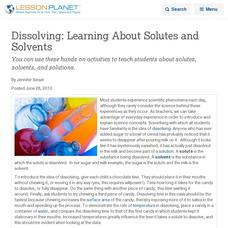Curated OER
Explore: 5th Grade Dissolved Oxygen
Fifth graders, in groups, use basic science process skills to measure and compare the dissolved oxygen levels and pH levels of distilled, stream, and pond water.
Curated OER
Nature of Science and Measurement Review
In this nature of science and measurement learning exercise, high schoolers answer 30 questions about experimental design, pure science vs. applied science, density, metric conversions and dimensional analysis.
Curated OER
Science Quick Vocabulary Review Worksheet
In this science worksheet, students read 15 science definitions and determine which science vocabulary word fits each definition. Students write their answers in the box that precedes each definition.
Curated OER
Science Multiple Choice Words Worksheets
In this science activity, students choose the multiple choice science term that best matches the 15 definitions stated. Students circle their answers.
Curated OER
Sugar in Tea
Little chemists address whether or not you can get sugar back out of tea after it has dissolved. The PowerPoint itself simply walks them through the questioning process, considering different possibilities. The final slide settles on...
American Chemical Society
Investigating the Line
Note that this instructional activity is best paired with the preceding instructional activity in the unit. In that instructional activity, elementary physical scientists observed that the color coating of M&Ms® candies do not mix...
Curated OER
Dissolving Gobstoppers
Students design their own experiments . They study the scientific method and determine what a testable question is. They distinguish between questions that are testable and those that are not. They identify variables, make and understand...
Curated OER
Dissolved Oxygen Activity
Students explore why dissolved oxygen must be present for aquatic life to survive. They explain what dissolved means. Students discuss what dissolved oxygen is. They watch as the teacher lights two candles and place a jar over one of...
Curated OER
Simulating the Effects of Biodegradable Wastes on Dissolved Oxygen
Students evaluate the relationship between biodegradable waste and dissolved oxygen in water. In this biodegradable wastes lesson students complete a lab activity in groups then analyze their results.
American Chemical Society
Temperature Affects the Solubility of Gases
Dare your class to drive dissolved carbon dioxide out of carbonated liquid at different temperatures to discover if there is a difference in rate. To make this experiment more sound, have explorers use equally measured amounts of soda...
American Chemical Society
Solubility Test
Make sure to consult the teacher's handbook, Inquiry in Action - Investigating Matter Through Inquiry, for two demonstrations that can be done to introduce solubility and measuring crystal mass before having the class conduct this...
Curated OER
What is the Percentage of Copper in "Copper" Coins?
Whether in the UK or in the US, the mass of the copper in a copper alloy penny can be determined. If you are in the US, just note that on the lab sheet, a penny is identified as a "1p piece." The penny is dissolved by young chemists in...
Baylor College
What Is a One Part Per Million Solution?
Water may appear to be crystal clear, but there could be dissolved substances present. Lab groups make a one-part-per-million of a food coloring solution to demonstrate this concept. As part of an outstanding unit about water, this...
Baylor College
How Can We Find Out What Is in Water?
Using paper chromatography, water watchers discover that several substances might be dissolved even though they aren't visible. In this case, you will prepare a mixture of three different food colorings for them to experiment with. A...
American Chemical Society
Recrystallization Test
Crystallize the answer to the question that has been investigated since the first of four lessons: What is the unknown crystal? Pupils have examined, crushed, and dissolved four samples plus an unknown as an exploration of the properties...
Cornell University
Energy Changes in Chemical Reactions
The heat of solution measures how much thermal energy a dissolving substance consumes or gives off. The experiment demonstrates both endothermic and exothermic reactions. Scholars dissolve several substances, measure the temperature...
Virginia Department of Education
Properties of Compounds and Chemical Formulas
Young chemists have unknown compounds they need to sort. Performing three different tests on each, the chemical behaviors they observe become the basis for data analysis.
Curated OER
Investigating the Change
Sugar crystal growth is observed as an example of physical change and cabbage juice pH indicator is used to demonstrate chemical change. The crystal growth is tracked over five days. The cabbage juice experiment is involved and can also...
Curated OER
Find the Percent of Iron in Manganate (VII)
Dilute sulphuric acid is used to oxidize manganate (VII) into manganese (II) and water. Step-by-step procedures are outlined on the worksheet as well as calculations for junior chemists to perform in their science journals. This...
Baylor College
Why Circulate?
Lub-dub, lub-dub. Why does the heart beat? Why does blood circulate throughout the body? Life scientists find out how important circulation is for dissolving and dispersing materials by timing how long it takes for food coloring spread...
American Chemical Society
All Wet
Sometimes liquids just don't get along together. A fun experiment has scholars determine whether various liquids dissolve in water. They pour isopropyl alcohol, vegetable oil, and corn syrup into cups of water to see which ones mix well...
Curated OER
What If There's No Light?
students discuss the importance of light and the consequences of living without it. Using a plant as a demonstration, students predict and observe what happens to a plant when it does not receive enough light. In groups, they experiment...
American Chemical Society
Colors Collide or Combine?
As part of a unit investigating the dissolving of M&Ms® candy coating, this lesson examines whether or not the different colors combine. There are no new concepts revealed in this particular lesson, but learners will see that the...
Curated OER
Dissolving: Learning About Solutes and Solvents
You can use these hands on activities to teach students about solutes, solvents, and solutions.






